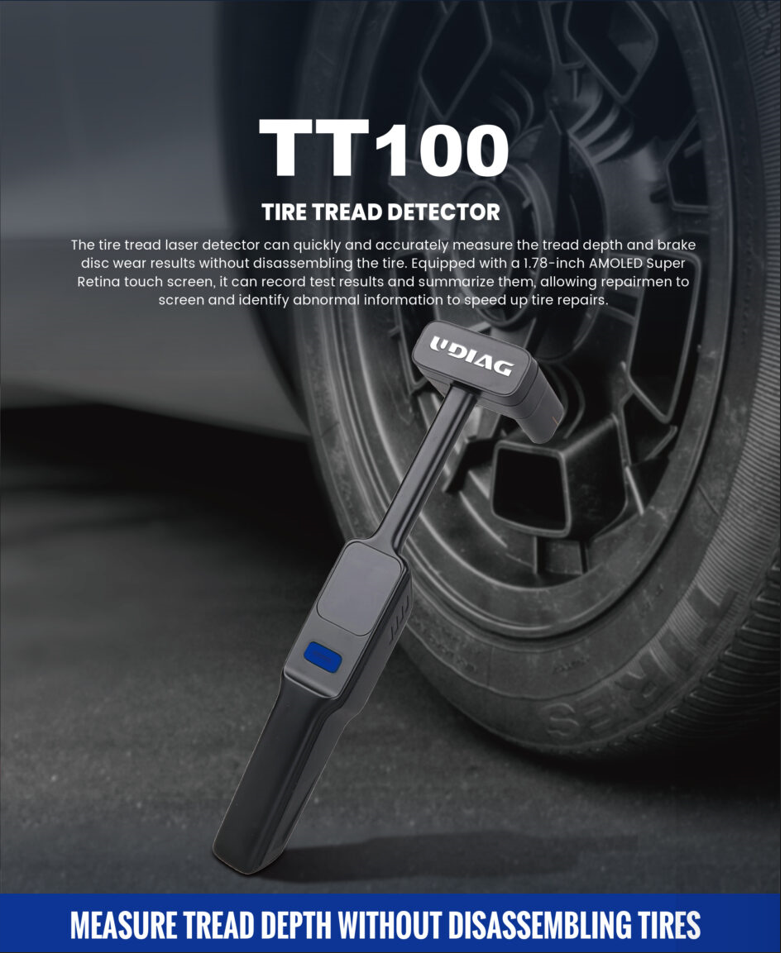Why are tire tread detectors important?
2024-05-16 by UDIAG
Tire tread detectors play a pivotal role in modern automotive safety and efficiency. These devices, often integrated into vehicles or used as standalone tools, serve the crucial function of monitoring the condition of tire treads. The importance of maintaining proper tire tread cannot be overstated, as it directly impacts safety, fuel efficiency, environmental sustainability, and economic considerations. This essay explores why tire tread detectors are indispensable in today’s automotive landscape.

I. Safety
One of the foremost reasons for the importance of tire tread detectors lies in safety. Adequate tire tread depth is essential for providing traction, especially on wet or slippery surfaces. Tires with insufficient tread depth are more prone to skidding and loss of control, increasing the risk of accidents. Moreover, proper tread depth reduces the likelihood of hydroplaning, where tires lose contact with the road surface due to water buildup. By detecting worn-out treads early, tread detectors contribute significantly to accident prevention and road safety.
II. Fuel Efficiency
Beyond safety, tire tread detectors also play a crucial role in enhancing fuel efficiency. The tread pattern and depth directly affect rolling resistance, impacting the energy required to propel a vehicle forward. Tires with worn-out treads experience increased rolling resistance, leading to higher fuel consumption. By promptly identifying tires with inadequate tread depth, tread detectors enable drivers to replace or rotate tires, optimizing fuel efficiency and reducing carbon emissions. Over time, the cumulative effect of improved fuel efficiency translates into substantial cost savings for individuals and businesses alike.
III. Environmental Impact
The environmental implications of tire tread detectors cannot be overlooked. Proper tire maintenance, facilitated by tread detection technology, helps extend the lifespan of tires. By maximizing tire longevity, fewer tires are discarded prematurely, thereby reducing tire waste. Additionally, maintaining optimal tread depth contributes to sustainable transportation practices by minimizing fuel consumption and associated greenhouse gas emissions. As societies strive towards environmental conservation, tire tread detectors emerge as valuable tools in promoting eco-friendly driving habits and reducing the automotive industry’s carbon footprint.
IV. Economic Considerations
From an economic standpoint, tire tread detectors offer tangible benefits. By ensuring that tires are replaced or rotated at the appropriate time, these devices help individuals and businesses avoid costly repairs or replacements resulting from tire wear or blowouts. Moreover, the long-term savings accrued through improved fuel efficiency and extended tire lifespan outweigh the initial investment in tread detection technology. By optimizing tire performance and reducing operational costs, tread detectors align with the principles of prudent financial management in both personal and commercial vehicle operations.
V. Technology Advancements
The evolution of tire tread detection technology underscores its importance in modern automotive engineering. Today’s tread detectors utilize advanced sensors, algorithms, and integration capabilities to provide real-time feedback on tire condition. Some systems are seamlessly integrated into vehicle safety systems, offering proactive alerts to drivers when tire tread depth falls below optimal levels. As technology continues to advance, there is potential for further innovation in tread detection methods, promising even greater precision and reliability in monitoring tire health.
VI. Regulatory Requirements
Compliance with tread depth regulations is another aspect that highlights the significance of tire tread detectors. Many jurisdictions impose minimum tread depth requirements to ensure road safety. Tread detectors enable drivers to stay informed about their tires’ condition, empowering them to meet regulatory standards and avoid potential legal repercussions associated with driving on worn-out tires. Regular inspections facilitated by tread detection technology contribute to a culture of compliance with safety regulations, fostering responsible driving practices within the community.
Conclusion
In conclusion, tire tread detectors are indispensable tools that play a multifaceted role in enhancing automotive safety, efficiency, and sustainability. From preventing accidents and improving fuel economy to reducing environmental impact and ensuring regulatory compliance, the importance of these devices cannot be overstated. As technology continues to evolve, tire tread detection methods will undoubtedly become more sophisticated, further enhancing their effectiveness in safeguarding lives, conserving resources, and advancing the automotive industry towards a safer, greener future.
Get Access Now: https://www.udiagtech.com
FAQs
1. What is a tire tread detector?
A tire tread detector is a device or system designed to monitor the depth and condition of tire treads. It helps drivers assess the health of their tires and identify when they need maintenance or replacement.
2. How do tire tread detectors work?
Tire tread detectors typically use sensors or scanning technology to measure the depth of tire treads. Some systems integrate with vehicles and provide real-time feedback to drivers, while others are standalone devices that require manual operation.
3. Why are tire tread detectors important for safety?
Tire tread depth is critical for maintaining traction and stability, especially in wet or slippery conditions. Tire tread detectors help prevent accidents by alerting drivers when their tires have inadequate tread depth, reducing the risk of skidding or hydroplaning.
4. How do tire tread detectors contribute to fuel efficiency?
Tires with proper tread depth experience lower rolling resistance, resulting in improved fuel efficiency. By detecting worn-out treads early, tire tread detectors enable drivers to replace or rotate tires, optimizing fuel consumption and reducing carbon emissions.
5. What environmental benefits do tire tread detectors offer?
Tire tread detectors help extend the lifespan of tires by facilitating timely maintenance. This reduces tire waste and promotes sustainable transportation practices by minimizing the environmental impact of tire disposal and production.
6. Are there economic advantages to using tire tread detectors?
Yes, tire tread detectors offer economic benefits by helping drivers avoid costly repairs or replacements resulting from tire wear or blowouts. Additionally, improved fuel efficiency and extended tire lifespan lead to long-term cost savings for individuals and businesses.


